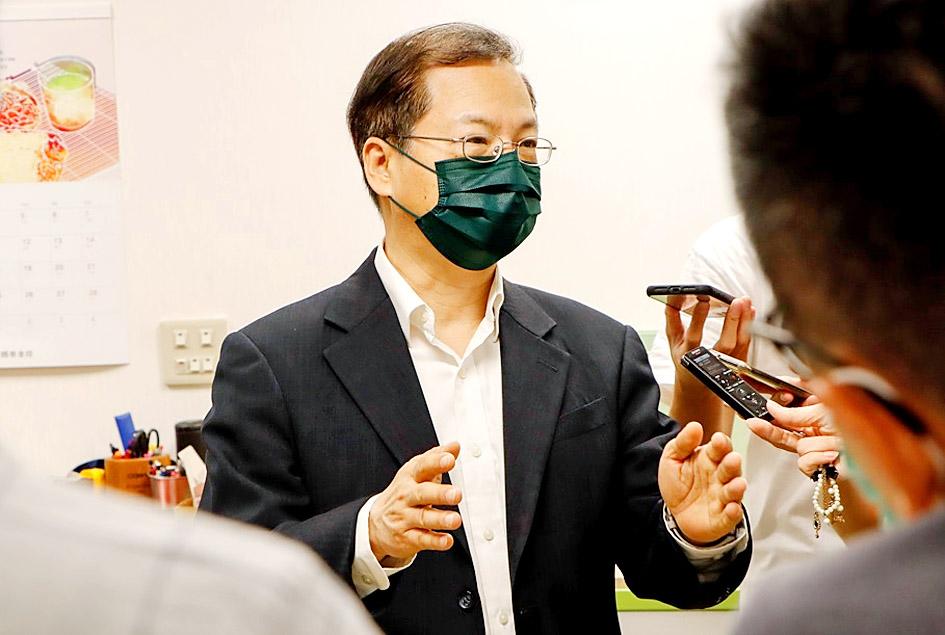With the help of the Quintuple Stimulus Voucher program, Taiwan might have a chance to achieve 6 percent GDP growth this year, National Development Council (NDC) Minister Kung Ming-hsin (龔明鑫) said yesterday, as he is betting on the vouchers to provide a “quick boost” to the economy.
“The Directorate-General of Budget, Accounting and Statistics is predicting economic growth of 5.88 percent for this year, but if the effects of the vouchers start kicking in during the fourth quarter, then that could push GDP growth above 6 percent,” Kung told reporters in Taipei.
The Executive Yuan plans to launch the Quintuple Stimulus Voucher program next month to reinvigorate the economy, which has been hit by a COVID-19 outbreak that started in the middle of May.

Photo courtesy of the National Development Council
“The Triple Stimulus Voucher program last year provided a marked boost to the local retail, food and beverage, and lodging sectors, meaning that it did the job of lighting the fire of consumption,” Kung said. “The Quintuple Stimulus Voucher program does not just increase the dollar amount, it is being met with enthusiasm by local governments, banks and stores, with the aim of helping consumers increase the value of their vouchers.”
It is those extra incentive programs that led Kung to predict a “doubling of benefits.”
“Optimistically, the effects on the economy could reach as high as NT$200 billion [US$7.21 million],” he said.
However, whether the program would take effect in time to affect this year’s GDP growth is still in question, he added.
“There’s still a lot of preparatory work to be done,” Kung said. “If we can bring it forward [for the Mid-Autumn Festival], then we will.”
If the program starts earlier than anticipated, its main effect will fall in the final quarter of this year. If it does not, the benefits will be seen in the first quarter of next year, he said.
Minister of Economic Affairs Wang Mei-hua (王美花) said that the NT$500 bonus vouchers the Ministry of Economic Affairs is planning to offer as part of the Quintuple Stimulus Voucher program would benefit the food and beverage sector, as they can only be spent at night markets, food stalls, bakeries and restaurants.
There would be 4 million bonus vouchers and they can only be claimed by those receiving their Quintuple Stimulus Vouchers digitally, Wang said.
When asked by Z Media’s (震傳媒) Frances Huang (黃光芹) about the objections of small vendors to the hassle and fees that come with receiving digital payments, Wang said the ministry would be subsidizing digital transaction fees for six months to incentivize them to go digital.
“We will be helping small vendors acclimatize to the change. In the long term, digital transactions are going to be more popular in the post-pandemic economy,” she said.

Hon Hai Precision Industry Co (鴻海精密) is reportedly making another pass at Nissan Motor Co, as the Japanese automaker's tie-up with Honda Motor Co falls apart. Nissan shares rose as much as 6 percent after Taiwan’s Central News Agency reported that Hon Hai chairman Young Liu (劉揚偉) instructed former Nissan executive Jun Seki to connect with French carmaker Renault SA, which holds about 36 percent of Nissan’s stock. Hon Hai, the Taiwanese iPhone-maker also known as Foxconn Technology Group (富士康科技集團), was exploring an investment or buyout of Nissan last year, but backed off in December after the Japanese carmaker penned a deal

SUPPORT: The government said it would help firms deal with supply disruptions, after Trump signed orders imposing tariffs of 25 percent on imports from Canada and Mexico The government pledged to help companies with operations in Mexico, such as iPhone assembler Hon Hai Precision Industry Co (鴻海精密), also known as Foxconn Technology Group (富士康科技集團), shift production lines and investment if needed to deal with higher US tariffs. The Ministry of Economic Affairs yesterday announced measures to help local firms cope with the US tariff increases on Canada, Mexico, China and other potential areas. The ministry said that it would establish an investment and trade service center in the US to help Taiwanese firms assess the investment environment in different US states, plan supply chain relocation strategies and

WASHINGTON POLICY: Tariffs of 10 percent or more and other new costs are tipped to hit shipments of small parcels, cutting export growth by 1.3 percentage points The decision by US President Donald Trump to ban Chinese companies from using a US tariff loophole would hit tens of billions of dollars of trade and reduce China’s economic growth this year, according to new estimates by economists at Nomura Holdings Inc. According to Nomura’s estimates, last year companies such as Shein (希音) and PDD Holdings Inc’s (拼多多控股) Temu shipped US$46 billion of small parcels to the US to take advantage of the rule that allows items with a declared value under US$800 to enter the US tariff-free. Tariffs of 10 percent or more and other new costs would slash such

Three experts in the high technology industry have said that US President Donald Trump’s pledge to impose higher tariffs on Taiwanese semiconductors is part of an effort to force Taiwan Semiconductor Manufacturing Co (TSMC, 台積電) to the negotiating table. In a speech to Republicans on Jan. 27, Trump said he intends to impose tariffs on Taiwan to bring chip production to the US. “The incentive is going to be they’re not going to want to pay a 25, 50 or even a 100 percent tax,” he said. Darson Chiu (邱達生), an economics professor at Taichung-based Tunghai University and director-general of